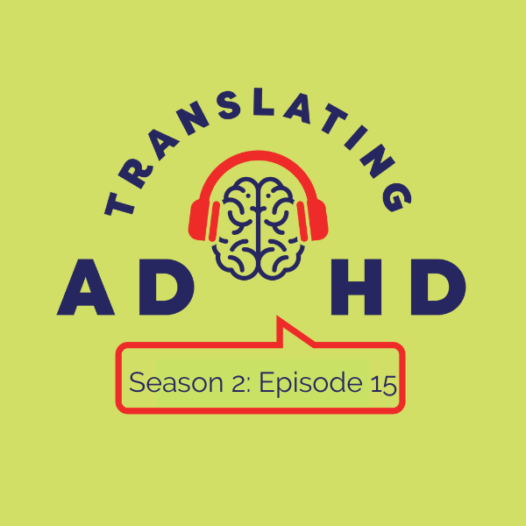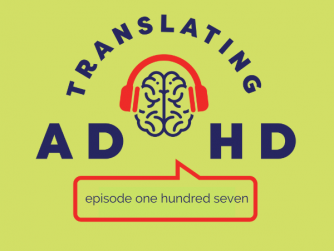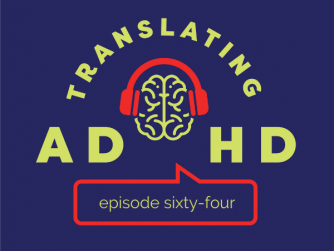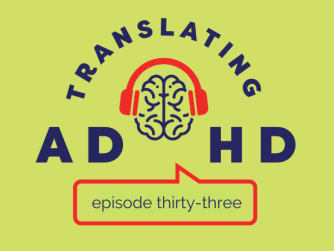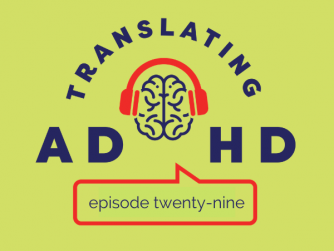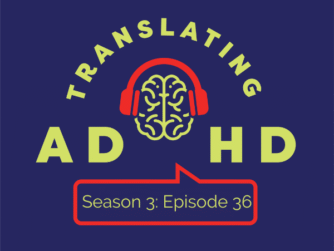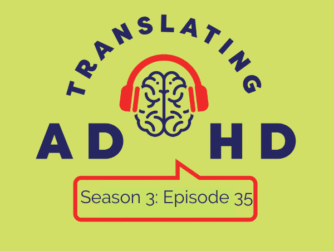Asher and Cam were invited to present at the Annual International Conference on ADHD in Maryland. In this mini-episode of the podcast, they offered their ADHD coaching perspectives to discuss how nuance, distinction and curiosity can help us live more authentically.
Episode links + resources:
For more of the Translating ADHD podcast:
- Episode Transcripts: visit TranslatingADHD.com and click on the episode
- Follow us on Twitter: @TranslatingADHD
- Visit the Website: TranslatingADHD.com
Episode Transcript:
[00:00:00] Ash: Hi, I’m Ash, [00:00:08] Cam: And I’m Cam. [00:00:09] Ash: And this is Translating ADHD. The following episode was recorded live in the expo hall of the International Conference on ADHD on November 1st, 2023. Thank you to our friends at Attention Different Media for providing this recording and a video recording, which we will post later for us. You can find Attention Different Media @attndifferent on Twitter and Attention_Different on Instagram. [00:00:40] Event Host: The ADHD Essentials podcast is not the only podcast on the planet, so I brought my friends Cam and Asher. Cam is an award-winning coach, by the way, as of yesterday, so that’s pretty dope. So I’m going to hop off the stage, I’m going to give the mic to Asher, I’m going to hop off the stage. They’re going to jump right into recording an episode of their podcast, Translating ADHD. [00:01:11] Ash: I’m Ash [00:01:18] Cam: And I’m Cam [00:01:19] Ash: And this is Translating ADHD [00:01:22] Cam: And we are at the Annual International ADHD Conference in Baltimore, Maryland, my hometown. I grew up here. We have an incredibly different environment here. So we’ve got, we’re not sitting across from each other in a Zoom call doing our regular thing. [00:01:39] Ash: No, we’re face-to-face. It’s a little weird. [00:01:42] Cam: A little weird, and we are in the corner of the Expo. So there’s a lot of stimuli vying for my attention right now. [00:01:51] Ash: Look at me Cam. Look at my beautiful face. [00:01:54] Cam: We’re gonna talk about that and we’re gonna introduce people here on the premise of the show Translating ADHD And so we are two ADHD coaches. We bring a coaching perspective to looking and living, working, and succeeding with ADHD. And today we’re going to talk about three areas.What we do on the show is introduce coaching skills and mindset tools that listeners can work with. What we want to be clear is that we’re not training people through our podcast. We don’t expect people to become coaches through our podcast. When listeners, people with ADHD, come to coaching, they’re not thinking about the coaching. They’re thinking about their dilemma. They want to solve the dilemma. So it’s our job as coaches to educate them about the coaching process. So we do that on the show.
Today, we’re going to demonstrate that. And we’re going to focus on one skill of curiosity. Another skill of distinction. And when we utilize curiosity and distinction together, we can start to find nuance. And so in this room, it’s really hard to find nuance because it’s so stimulating.
William Dodson talks about how we have an interest-based nervous system. We like to say, in addition to that, we have a big signal attention system. Our attention system is drawn to the big signal, and we are in a space that is testing my attention system, Ash.
[00:03:25] Ash: You’re doing great, Cam. [00:03:26] Cam: Yeah. So, what we’re gonna do today is we’re gonna get into a client example, utilizing some of the things that we use here. So again, a few coaching skills, the way a coach might look at a situation. Metaphor is a powerful way. And so Ash has a client story to sort of illustrate the idea of how can you use curiosity to find nuance and find the distinction in that nuance. And we’re actually going to talk about time blindness. And we’re going to talk about how might you approach that with a coaching lens.So, you want to start with the example, Ash?
[00:04:06] Ash: Yeah, but before we dive into the example, let’s talk about what you might find if you Google time blindness. You might find advice like getting a planner, using a calendar, using a visual timer like the one in front of us, and wearing a watch, right? And the thing is if that advice worked, this conference and the industry of ADHD coaching would not exist because we’d do those things and we’d be done.So I had this client who I’d been working with for quite a while show up to a coaching session. And he says, I want to talk about time blindness. I say, okay, what’s going on? This client is a bat biologist, which is just a cool job, by the way. The dilemma he was facing was on days where he was going site to collect and record data from each site, he wasn’t stopping at each site to record the data before moving on to the next site. He didn’t know why. So then he’d get home at the end of the day, and he’d have all of this data from all of the sites, which would take three times as long to do than if he did it at each site. Completely confused by this behavior. And the only thing he knows, or thinks he knows, is that it’s time blindness.
So we start talking about it a little bit and he starts by saying my brain gets in a whirlwind. I say, what does that mean?
[00:05:41] Cam: Can I jump in for a second? Yeah. Just that we’re here and it’s like listeners. Yeah. This is this experience where we are out in the field collecting notes. who identifies with this? Where you’re doing work. Again, we’ve talked about this before in the sense of with physicians, in the sense of meeting with a patient. And then the note-taking, the follow-up type material. I’ll do that later, right? I don’t have to do that right now. It’s sometime in the future. Anyone with ADHD can really appreciate this client’s dilemma. [00:06:13] Ash: Sure. In this case, the client wasn’t even sure that he was making a decision. It just sort of happened. So he gets into what he calls a whirlwind brain. He’s thinking about getting to the next site. He’s thinking about traffic. He’s thinking about what’s for dinner tonight. And he just forgets or does he? As we start to talk about it a little bit more, he realizes, Ooh, there’s a story I tell myself that causes me to not record the data. And it’s that when I get home, and I sit on my nice comfy couch in my sweatpants, I am going to feel like doing all of this data entry. And I believe it in the moment, even though that has never once been my experience. I am always mad at myself when I get home and I’ve left this task for my future self. [00:07:10] Cam: So what is the coaching that you’re doing there, right? As a coach you’re there in the room with your client, what are you doing around distinction and curiosity to start to get in and work around the nuance, the more subtle signals around that, Okay, here’s a dilemma that I’m convinced there’s a story that I’m going to do this. Delineating and distinguishing present self from future self. But what are you doing, Ash, as a coach there in partnership with your client? [00:07:42] Ash: It’s a great question, Cam. So starting back with that whirlwind brain, that’s some powerful language. So I asked some questions about what that is. And he slowed down and really started to think about it, which is when that awareness emerged about this story I tell myself. And he was so shocked by that, like genuinely did not know that was happening in the background.So there’s this big aha. Now let’s see what’s going on with that aha. So now we start talking about that, and he’s a big Marvel nerd, right? So I lead with it almost sounds like the devil on one shoulder, angel on the other, and he’s like no, it’s, you know what it’s like? It’s like Loki, the Trickster God. Because in the moment that voice is so, it’s not me, I know that I’m going to be so mad at myself later. But in the moment that voice is so compelling, that before, without even consciously realizing it has happened, I am making this decision to put this burden on my future self. Because in that brief moment where I’m semi-consciously making a decision, I truly believe that I’m going to be happy to sit on my couch in my sweatpants and do data entry and it’s going to be great.
[00:09:10] Cam: So this is illustrating, there’s a couple of things here that there are themes in the podcast that we bring forward. And one is, again, our tagline is understand, own, translate your ADHD. So this is your client understanding time blindness in a different way, right? In the room where you’re modeling curiosity for him, he can bring curiosity, look at the nuance and make important distinctions, right?So understanding, and then that second part, which can be so hard with ADHD is the acceptance piece. To take ownership of this. This ownership of this behavior to recognize, Oh, okay, this is going on. And then I can do something about it, which is to translate. To translate and start to think about, how can I approach this differently? So then what did you do with your client to approach it differently, Ash?
[00:10:04] Ash: It’s a great question, Cam. And really in this case, not much because the thing here was the awareness and giving it a name. That metaphor was so powerful for my client, that the corresponding action was don’t let the Loki voice in. Just don’t even let it in.And so walking onto a site with that intention in mind made the difference for my client. Loki is a trickster. If I let him have my ear, I’m in trouble. So if I walk in with the intention to not even let that story crop up, then I’m going to have a different experience.
And he did have a different experience. And not just that. Loki has been a recurring theme in a lot of our other coaching. And not that it always shows up the same way, right? It’s not like now that we know this about his ADHD, we can solve a mass of dilemmas, just all at once doing the same thing. But more that it’s something that we know, it’s a thread that we can pull on when we’re looking at other dilemmas where Loki or something like Loki might be present.
And for this particular client, something that really works well for him is what he calls naming the voices, right? So giving it a name that resonates internally for him as to what that experience is generates a strong point of awareness in that moment that wasn’t there before so that he can pause, disrupt and pivot into having a different experience in a way that he was previously not able to.
[00:11:51] Cam: What that does is, giving it a visual like that, this recognition of the trickster and the Loki, starts to separate your experience from this individual, right? This distancing that starts to occur. You start to see the dilemma outside yourself because what happens with when we’re with time blindness, and why can’t I do these things? It creates this blame, shame, dread cycle and this emotional response. And we go down the dark funnel, and then where’s the motivation to try to create change?But when we start to look at these dilemmas and look at them with some distance, we start to activate our high contextual wiring, right? So we’re divergent thinkers. And what we do is, in this situation with time blindness, our divergent thinking will take it into, oh my God, I might lose my job. Oh my God, when am I going to do this?
And so, in this situation, to name it, to understand it, and appreciate it when it comes up again because one of the underutilized skills as individuals with ADHD is pattern recognition. Now we see Loki again, oh, are you there? Are you up to your old tricks? And we start to develop a road sign for Loki’s coming up. This is where Loki might make his entrance. And we can anticipate Loki and his antics. And we come up with, how do we counter? How do we get around Loki? And all of a sudden, we’ve moved away from this time-blindness place to, oh, a more nuanced appreciation of time and my own experience with time.
[00:13:30] Ash: That’s exactly it, Cam, and that’s what I was going to say next, is if we go all the way back to the beginning of that session where my client said, I think this is about time blindness, imagine if we had tried to jump into action just based on time blindness. We would have completely missed the point in which my client is having a behavior that he doesn’t want to have. We would have missed the cause. [00:13:57] Cam: So I think that was great, that was a great example. And it gives people here an idea at the conference, an idea of what we do. And they might listen to, again, our podcast, Translating ADHD. We started our second season. So our first season, in ADHD fashion, lasted for three and a half years, 181 episodes and over a million downloads.And we thought, what are we going to do? Because people kept saying, where do we start? Where do we begin? And there’s such this backlog, so we thought, you know what, let’s, we’re gonna do that for you. We’ll start again. So we’ve done a soft reboot in September.
If you want to jump into Translating ADHD and check it out, then start in September because we’re coming in and taking sort of the best. We’re getting, we’re, it’s like we’re churning. Making cream here, right? We’re dairy farmers, and we’re making the cream. Yeah, there’s a metaphor, and I don’t know if it’s working, but I’m just, we’re committed now, we’re committed now. Let us do the creamery work, right? Churn the butter, get that thing so that you don’t have to.
Coaches, if you’re listening, this is a little bit inside baseball on how to approach coaching. We know a lot of coaches who share this podcast with their clients, and then you start to boost your client’s coaching IQ, right. And then you have a better partner, and that’s my talk tomorrow that I’m doing here is partnering with our clients.
So as we finish up, Ash, what we like to do as we lead out with our episodes is to think about listeners. What can you do?
[00:15:38] Ash: Cam, I’d like to say one more thing before you go there. And that’s specifically to the coaches that might be listening today or might be listening to the podcast. You Cam, are an award-winning coach, and your mentoring and leadership has had a tremendous impact on the ADHD coaching industry. So, coaches, not tooting my horn here, but definitely tooting Cam’s. You can learn a lot about coaching excellence by listening to our podcast and having Cam model that for you. I certainly have. [00:16:12] Cam: Oh, that’s really great. Thank you, Asher. Thank you so much. Yeah, that was a pleasant surprise for me.So, as we finish up, think about a big signal that’s got your attention, right? Time blindness. What’s another one? A big signal might be procrastination. It might be, Oh, my friend, I’m just so tired of them always being late, or always yelling at me for being late, or like some drama, some big signal that has your attention.
And to, maybe not in this expo room because there’s lots of signals here, but as you said earlier, find a quiet place to explore that and really be curious about it. What’s the big signal? What has your attention? And to look at it and just back away, take a little distance like you did with your client. If there’s time blindness, and to look at the whole pattern starting with the lead into that signal and the lead out.
And just be thinking about it. Bring some curiosity. Start to distinguish. One of the things we like to say is that you cannot prioritize if you have not distinguished what is a priority first. And so distinguishing is skill that is underutilized. And to be thinking about just the subtle differences. If you sit for a moment, I do it while walking.
You’re like, Cam, I can’t sit down and slow down. Go around the block. Be with your thoughts. Be curious about this. Just sit and ponder and give yourself a break. If you’re noticing you’re giving yourself a hard time, give yourself a break. Come back with curiosity. Maybe do it with a friend. Do it with your coach. This is something that you can do with someone else. Look for those distinctions.
And as you sit and you’re curious, that big signal starts to come down, and you start to notice those subtle signals. That was the big difference for me. I’m an adult with ADHD. I’ve suffered with it all my life. And the big difference is for me to understand the power of big signals and not just be reactive to them all the time. Getting jerked around. They’re there. They’re always going to be there. They’re not going to go away. But how can you navigate those big signals? And bring some curiosity, and I’m going to say grace and compassion, right? Because we can be so hard on ourselves.
[00:18:33] Ash: So I’m Ash. [00:18:35] Cam: I’m Cam. [00:18:36] Ash: And this was the Translating ADHD podcast. Thanks for listening.
